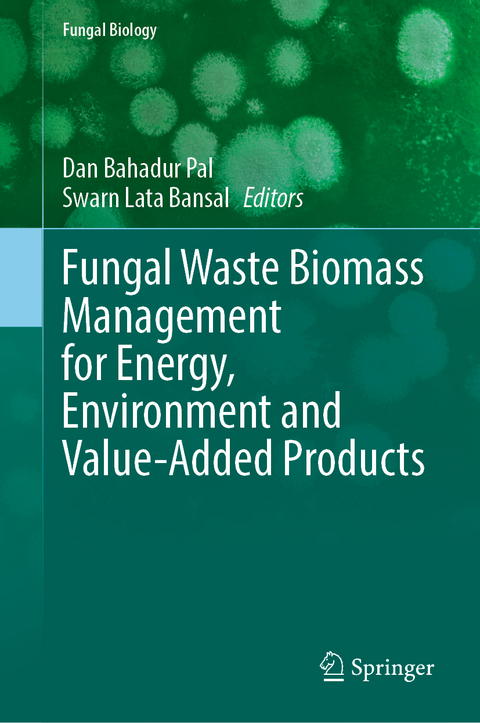
Fungal Waste Biomass Management for Energy, Environment and Value-Added Products
Springer International Publishing (Verlag)
978-3-031-82598-9 (ISBN)
- Noch nicht erschienen - erscheint am 22.03.2025
- Versandkostenfrei
- Auch auf Rechnung
- Artikel merken
Bioconversion of waste is a natural process aiding in the recovery of resources and biotechnology-facilitated natural recycling processes. Biotechnological treatments to food processing wastes found in large quantities can produce useful end products, such as microbial biomass protein, while wastes are also purified during the process. Fungi as microorganism and as fungal biomass have been used for many applications such as enzyme production for biomedical, biorefinery, and other industries.
Additionally, environmental pollution is a crucial problem for the entire world, and it is growing continuously. Continuous growth of pollution is resulting harmful changes like global warming and pollution of air, water, and soil. These changes are directly associated with various activities like uncontrolled agricultural practices, deforestation, urbanization, accumulation of huge amounts of agricultural and food waste, improper dumping of naturally occurred waste and forest residues, etc. Therefore, proper utilization of these wastes may be a better solution for this problem.
Fungal-based biomass materials are good sources of carbohydrates, oil & fats, cellulosic content, and other useful chemical components which can be converted into value-added products for production of clean energy, bioenergy, bio-adsorbents, and useful chemicals. This book provides information, processes, and ideas for the conversion of waste into useful and consumable enzymes through biological approaches. Within the last few years, researchers have found that food and agricultural waste biomass have the potential to produce value-added products. Technological information for the production of nutraceuticals and organic acids from the agro-waste are also covered in this book.
Dr. Dan Bahadur Pal
B. Tech, M. Tech, PhD
Assistant Professor, Department of Chemical Engineering, Harcourt Butler Technical University, Kanpur-208002, Uttar Pradesh India
Dr. Pal is currently working as an Assistant Professor, Department of Chemical Engineering, Harcourt Butler Technical University, Kanpur-208002, Uttar Pradesh India. He has received his M. Tech in 2011 and Ph.D. in 2017, in the field of Chemical Engineering from Indian Institute of Technology (BHU) Varanasi, Uttar Pradesh, India. Before that, he has completed his B. Tech in Chemical Engineering from UPTU, Lucknow in 2006. Dr Pal completed doctorate degree in the field of nanotechnology and catalysis. These nanofibers have very promising potential to provide benefits to nanotechnologies, energy, environment, catalysts, sensors etc. While pursuing research I got the total number of 92 publications in the international referred journals and six book, thirty book chapters. From all the publication I got 3027 citations with 24 h-index and 54i-10-indexes. Dr. Pal s research interest is nano-technology, catalysis, energy and environment and waste management with a special focus in developing process and materials by using waste as raw materials. He also prefers to work on bio-waste processing and value addition.
Dr Swarn Lata Bansal
B.Sc., M.Sc. and Ph. D in Chemistry from Lucknow University
Working as Research Associate in Kanpur DAV College, Kanpur, UP, India. Dr Bansal completed doctorate degree in the field of biotechnology and environment. While pursuing research I got the total number of 12 publications in the international referred journals and conference papers and book chapters.
Sustainable Hybrid Composites, Constructed from Cellulose Nanofibrils and Wood Fungal Mycelium.- Fungal Waste Biomass as a Feedstock for Polylactic Acid (PLA) Production.- Utilizing Fungal Mycelium in Bio-Nanocomposites as A Replacement for Chemically Synthesized Light Weight Polymers.- Life Cycle Assessment and Techno-Economic Analysis on Setting Up of Pilot Scale Plants.- Importance of Utilizing Fungus Rather Than Bacteria for Biomass Valorization.- Extraction and Purification of Essential Oils from Food Waste Biomass.- Exploring the Potential of Fungal Biomass in the Evolution of Polylactic Acid (PLA) Biocomposites.- Biochar from Bio-Based Materials : Applications, Clean Technologies and Novel Production Methods.- Advanced Materials from Fungal Mycelium: Fabrication and Tuning of Physical Properties.- Rice Polishing as a Substrate for Fungal Biomass and Protein Production by Trichoderma harzianum and Candida utilis.- Enzymes Playing Their Specific Roles in Biomass Waste Management.- Production of Hemicellulose from Biomass and Agricultural/Food Waste Contains Lignocellulosic Materials.- Extraction and Purification of Essential Oils from Food Waste-Derived Waste Biomass.
| Erscheint lt. Verlag | 22.3.2025 |
|---|---|
| Reihe/Serie | Fungal Biology |
| Zusatzinfo | VI, 326 p. 34 illus., 27 illus. in color. |
| Verlagsort | Cham |
| Sprache | englisch |
| Maße | 155 x 235 mm |
| Themenwelt | Naturwissenschaften ► Biologie ► Mikrobiologie / Immunologie |
| Naturwissenschaften ► Biologie ► Mykologie | |
| Schlagworte | biomass • Bitechnology • environmental biotechnology • Environmental sustainability • Fungal Biotechnology • Fungi • Green Technology • value-added products • waste management |
| ISBN-10 | 3-031-82598-5 / 3031825985 |
| ISBN-13 | 978-3-031-82598-9 / 9783031825989 |
| Zustand | Neuware |
| Informationen gemäß Produktsicherheitsverordnung (GPSR) | |
| Haben Sie eine Frage zum Produkt? |
aus dem Bereich


